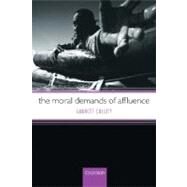The Moral Demands of Affluence
, by Cullity, Garrett- ISBN: 9780199204151 | 0199204152
- Cover: Paperback
- Copyright: 11/23/2006
How much are we morally required to do to help people who are much worse off than us? Philosophers have often raised this question in assessing the plausibility of particular moral theories. But it is a pressing question whatever one's moral outlook. Any plausible moral outlook shouldrecognize requirements of beneficence - requirements grounded directly in other people's need for assistance. Given this, there is a forceful case for thinking that we are morally required - not only collectively, but also as individuals - to devote a substantial proportion of what we have tohelping the poor.One way to present this case is by means of a simple analogy: an analogy between giving money to an aid agency and rescuing a needy person directly. Part I of Garrett Cullity's book examines this analogy in detail, discussing the ways in which it is politically and metaphysically simplistic.However, there remains an important truth in the simple analogy. It is that we are morally required to help. In one way, our world imposes a radical separation between its rich and poor inhabitants: our material circumstances are starkly different. In another way, however, it does not: the human experiences and fulfilments of rich and poor are fundamentally the same. This is an important part of the casefor thinking that their welfare grounds requirements of beneficence on us to help them. But Part II shows that it is also part of the case for limiting those requirements. Drawing attention to the range of goods that ground requirements on us to help each other, Cullity argues that theserequirements only make sense on the assumption that a life of a certain kind - a life that is not restricted in an extremely demanding way - is one that it is not wrong for us to live.







